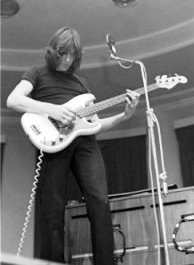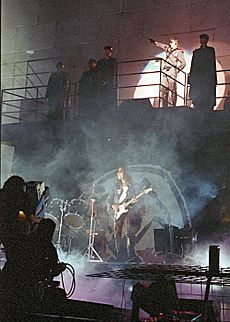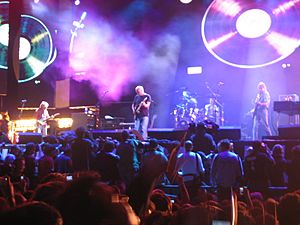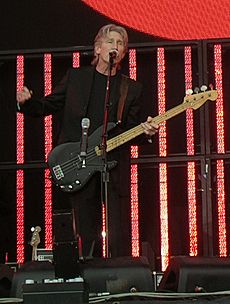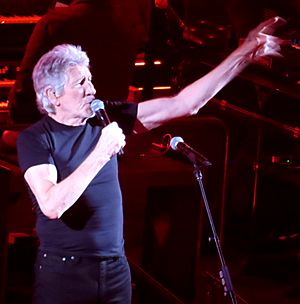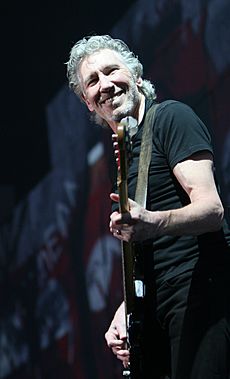Roger Waters facts for kids
Quick facts for kids Roger Waters |
|
|---|---|
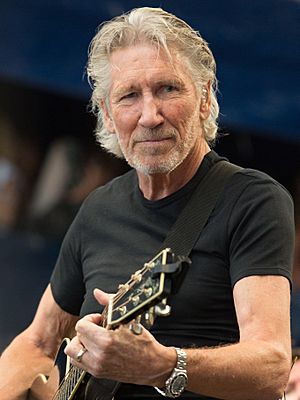
Waters at Newport Folk Festival, 2015
|
|
| Background information | |
| Birth name | George Roger Waters |
| Born | 6 September 1943 Great Bookham, England |
| Genres | |
| Occupation(s) |
|
| Instruments |
|
| Years active | 1964–present |
| Labels | |
| Members | List |
George Roger Waters (born 6 September 1943) is an English musician and singer-songwriter. In 1965, he co-founded the rock band Pink Floyd as the bassist. Following the departure of the songwriter, Syd Barrett, in 1968, Waters became Pink Floyd's lyricist, co-lead vocalist and conceptual leader until his departure in 1985.
Pink Floyd achieved international success with the concept albums The Dark Side of the Moon (1973), Wish You Were Here (1975), Animals (1977), The Wall (1979), and The Final Cut (1983). By the early 1980s, they had become one of the most critically acclaimed and commercially successful groups in popular music. Amid creative differences, Waters left in 1985 and began a legal dispute over the use of the band's name and material. They settled out of court in 1987. Waters's solo work includes the studio albums The Pros and Cons of Hitch Hiking (1984), Radio K.A.O.S. (1987), Amused to Death (1992), and Is This the Life We Really Want? (2017). In 2005, he released Ça Ira, an opera translated from Étienne and Nadine Roda-Gils' libretto about the French Revolution.
In 1990, Waters staged one of the largest rock concerts in history, The Wall – Live in Berlin, with an attendance of 450,000. As a member of Pink Floyd, he was inducted into the US Rock and Roll Hall of Fame in 1996 and the UK Music Hall of Fame in 2005. Later that year, he reunited with Pink Floyd for the Live 8 global awareness event, the group's only appearance with Waters since 1981. He has toured extensively as a solo act since 1999. He performed The Dark Side of the Moon for his world tour of 2006–2008, and the Wall Live tour of 2010–2013 was the highest-grossing tour by a solo artist at the time.
Waters incorporates political themes in his work and is a prominent supporter of Palestine. He has called for the removal of the Israeli West Bank Barrier and supports the Boycott, Divestment and Sanctions movement. He has described Israel's treatment of Palestinians as apartheid. Some of his comments, such as his likening of Israel to Nazi Germany, and elements of his live shows, have been accused of being anti-Semitic. He has dismissed the accusations as a conflation of anti-Semitism with anti-Zionism.
Contents
- Early years
- 1965–1985: Pink Floyd
- 1984–present: solo career
- 1984–1989: The Pros and Cons of Hitch Hiking and Radio K.A.O.S.
- 1989–1999: The Wall – Live in Berlin and Amused to Death
- 1999–2004: In the Flesh tour and Wall Broadway production
- 2005: Pink Floyd reunion and Ça Ira
- 2006–2009: The Dark Side of the Moon Live
- 2010s: The Wall Live and Is This the Life We Really Want?
- 2020s: This is Not a Drill, Pink Floyd disputes and The Dark Side of the Moon Redux
- Artistry
- Personal life
- Discography
- Tours
- Live band members
- See also
Early years
Waters was born on 6 September 1943, the younger of two boys, to Mary (née Whyte; 1913–2009) and Eric Fletcher Waters (1914–1944), in Great Bookham, Surrey. His father, the son of a coal miner and Labour Party activist, was a schoolteacher, a devout Christian, and a Communist Party member.
In the early years of the Second World War, Waters' father was a conscientious objector who drove an ambulance during the Blitz. He later changed his stance on pacifism, joined the Territorial Army and was commissioned into the 8th Battalion, Royal Fusiliers as a Second Lieutenant on 11 September 1943. He was killed five months later on 18 February 1944 at Aprilia, during the Battle of Anzio, when Roger was five months old. He is commemorated in Aprilia and at the Cassino War Cemetery. On 18 February 2014, Waters unveiled a monument to his father and other war casualties in Aprilia, Italy and was made an honorary citizen of Anzio. Following her husband's death, Mary Waters, also a teacher, moved with her two sons to Cambridge and raised them there. Waters' earliest memory is of the V-J Day celebrations.
Waters attended Morley Memorial Junior School in Cambridge and then the Cambridgeshire High School for Boys (now Hills Road Sixth Form College) with Syd Barrett. The future Pink Floyd guitarist David Gilmour lived nearby on Mill Road and attended the Perse School. At 15, Waters was chairman of the Cambridge Youth Campaign for Nuclear Disarmament (YCND), having designed its publicity poster and participated in its organisation. He was a keen sportsman and a highly regarded member of the high school's cricket and rugby teams. Waters was unhappy at school, saying: "I hated every second of it, apart from games. The regime at school was a very oppressive one ... The same kids who are susceptible to bullying by other kids are also susceptible to bullying by the teachers."
Waters met future Pink Floyd members Nick Mason and Richard Wright in London, at the Regent Street Polytechnic (later the University of Westminster) School of Architecture. Waters enrolled there in 1962, after a series of aptitude tests indicated he was well suited to that field. He had initially considered a career in mechanical engineering.
1965–1985: Pink Floyd
Formation and Barrett-led period
By September 1963, Waters and Mason had lost interest in their studies and moved into the lower flat of Stanhope Gardens, owned by Mike Leonard, a part-time tutor at the Regent Street Polytechnic. Waters, Mason and Wright first played music together in late 1963, in a band formed by vocalist Keith Noble and bassist Clive Metcalfe. They usually called themselves Sigma 6, but also used the name the Meggadeaths. Waters played rhythm guitar and Mason played drums, Wright played any keyboard he could arrange to use, and Noble's sister Sheilagh provided occasional vocals. In the early years the band performed during private functions and rehearsed in a tearoom in the basement of Regent Street Polytechnic.
When Metcalfe and Noble left to form their own group in September 1963, the remaining members asked Barrett and the guitarist Bob Klose to join. Waters switched to the bass. By January 1964, the group became known as the Abdabs, or the Screaming Abdabs. During late 1964, the band used the names Leonard's Lodgers, Spectrum Five, and eventually, the Tea Set. In late 1965, the Tea Set had changed their name to the Pink Floyd Sound, later the Pink Floyd Blues Band and, by early 1966, Pink Floyd.
By early 1966, Barrett was Pink Floyd's frontman, guitarist, and songwriter. He wrote or co-wrote all but one track of their debut LP The Piper at the Gates of Dawn, released in August 1967. Waters contributed the song "Take Up Thy Stethoscope and Walk" (his first sole writing credit) to the album. By late 1967, Barrett's deteriorating mental health and increasingly erratic behaviour rendered him "unable or unwilling" to continue in his capacity as Pink Floyd's songwriter and lead guitarist. In early March 1968, to discuss the band's future, Barrett, Mason, Waters, and Wright met with the band's managers, Peter Jenner and Andrew King, of the rock music management company they had all founded, Blackhill Enterprises. Barrett agreed to leave Pink Floyd, and the band "agreed to Blackhill's entitlement in perpetuity" regarding "past activities". Their new manager, Steve O'Rourke, made a formal announcement about the departure of Barrett and the arrival of Gilmour in April 1968.
Waters-led period
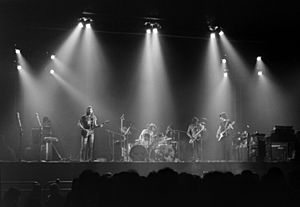
After Barrett's departure in March 1968, Waters began to chart Pink Floyd's artistic direction. In 1970, he composed – in collaboration with Ron Geesin – Music from The Body, a soundtrack for Roy Battersby's documentary The Body.
Waters said he wanted to "drag [Pink Floyd] kicking and screaming back from the borders of space, from the whimsy that Syd was into, to my concerns, which were much more political and philosophical". He became a dominant songwriter and the band's principal lyricist, sharing lead vocals with Gilmour and sometimes Wright. Throughout the late 1970s, he was the band's dominant creative figure until his departure in 1985. He wrote most of the lyrics to the five Pink Floyd albums preceding his departure, starting with The Dark Side of the Moon (1973) and ending with The Final Cut (1983), while exerting progressively more creative control. Every Waters studio album from The Dark Side of the Moon onwards has been a concept album.
With lyrics entirely by Waters, The Dark Side of the Moon is one of the most successful rock albums ever. It spent 736 consecutive weeks on the Billboard 200 chart—until July 1988—and sold over 40 million copies worldwide. As of 2005, it continued to sell over 8,000 copies a week. According to Pink Floyd biographer Glenn Povey, Dark Side of the Moon is the world's second-bestselling album and the United States' 21st-bestselling album.
In 2006, asked if he felt his goals for Dark Side had been accomplished, Waters said:
When the record was finished I took a reel-to-reel copy home with me and I remember playing it for my wife then, and I remember her bursting into tears when it was finished. And I thought, "This has obviously struck a chord somewhere," and I was kinda pleased by that. You know when you’ve done something, certainly if you create a piece of music, you then hear it with fresh ears when you play it for somebody else. And at that point I thought to myself, "Wow, this is a pretty complete piece of work," and I had every confidence that people would respond to it.
Waters' thematic ideas became the impetus for the concept albums The Dark Side of the Moon (1973), Wish You Were Here (1975), Animals (1977) and The Wall (1979) — written largely by Waters — and The Final Cut (1983), written entirely by him. The cost of war and the loss of his father became a recurring theme, from "Corporal Clegg" (A Saucerful of Secrets, 1968) and "Free Four" (Obscured by Clouds, 1972) to "Us and Them" from The Dark Side of the Moon, "When the Tigers Broke Free", first used in the feature film The Wall (1982), later included with "The Fletcher Memorial Home" on The Final Cut, an album dedicated to his father. The theme and composition of The Wall was influenced by his upbringing in an English society depleted of men after the Second World War.
The Wall, written almost entirely by Waters, is largely based on his life story. Having sold over 23 million RIAA certified units in the US as of 2013, is tied for sixth-most certified album of all time in America. Pink Floyd hired Bob Ezrin to co-produce the album and cartoonist Gerald Scarfe to illustrate the sleeve art. They embarked on The Wall Tour of Los Angeles, New York, London, and Dortmund. The last Pink Floyd performance of The Wall was on 17 June 1981, at Earls Court London, and this was Pink Floyd's last appearance with Waters until the band's brief reunion at 2 July 2005 Live 8 concert in London's Hyde Park, 24 years later.
In March 1983, the last Pink Floyd album with Waters, The Final Cut, was released. It was subtitled: "A requiem for the post-war dream by Roger Waters, performed by Pink Floyd". Waters wrote all the album's lyrics and music. His lyrics were critical of the Conservative Party government of the day and mention Prime Minister Margaret Thatcher by name. At the time Gilmour did not have any new material, so he asked Waters to delay the recording until he could write some songs, but Waters refused. According to Mason, after power struggles within the band and creative arguments about the album, Gilmour's name "disappeared" from the production credits, though he retained his pay. Rolling Stone gave the album five stars, with Kurt Loder describing it as "a superlative achievement" and "art rock's crowning masterpiece". Loder viewed the work as "essentially a Roger Waters solo album".
Departure and legal battles
Amidst creative differences, Waters left Pink Floyd in 1985 and began a legal battle with the band regarding their continued use of the name and material. In December 1985, Waters issued a statement to EMI and CBS invoking the "Leaving Member" clause in his contract. In October 1986, he initiated High Court proceedings to formally dissolve the Pink Floyd partnership. In his submission to the High Court he called Pink Floyd a "spent force creatively". Gilmour and Mason opposed the application and announced their intention to continue as Pink Floyd. Waters said he had been forced to resign like Barrett had been years earlier, and decided to leave Pink Floyd based on legal considerations, saying: "If I hadn't, the financial repercussions would have wiped me out completely."
Waters did not want the band to use the name Pink Floyd without him. He said later: "I would be distressed if Paul McCartney and Ringo Starr made records and went on the road calling themselves the Beatles. If John Lennon's not in it, it's sacrilegious ... To continue with Gilmour and Mason, getting in a whole bunch of other people to write the material, seems to me an insult to the work that came before." In December 1987, Waters and Pink Floyd reached an agreement. Waters was released from his contractual obligation with O'Rourke, and he retained the copyrights to the Wall concept and the inflatable Animals pig. Pink Floyd released three studio albums without him: A Momentary Lapse of Reason (1987), The Division Bell (1994) and The Endless River (2014). According to a 1999 interview with Gilmour, Waters declined an invitation to perform The Dark Side of the Moon with Pink Floyd at Earls Court, London.
In 2005, Waters said the period of his departure had been a "bad, negative time", and that he regretted his part in the negativity: "Why should I have imposed my feeling about the work and what it was worth on the others if they didn't feel the same? I was wrong in attempting to do that." In 2013, Waters said he regretted the lawsuit and had failed to appreciate that the Pink Floyd name had commercial value independent of the band members.
1984–present: solo career
1984–1989: The Pros and Cons of Hitch Hiking and Radio K.A.O.S.
In 1984, Waters released his first solo album, The Pros and Cons of Hitch Hiking, which dealt with Waters's feelings about monogamy and family life versus "the call of the wild". The album featured guitarist Eric Clapton, jazz saxophonist David Sanborn, and artwork by Gerald Scarfe. Kurt Loder described The Pros And Cons of Hitch Hiking as a "strangely static, faintly hideous record". Rolling Stone rated the album a "rock bottom one star". Years later, Mike DeGagne of AllMusic praised its "ingenious symbolism" and "brilliant use of stream of consciousness within a subconscious realm", rating it four out of five.
Waters toured the album with Clapton, a new band, and new material; the shows included a selection of Pink Floyd songs. Waters débuted his tour in Stockholm on 16 June 1984. The tour drew poor ticket sales and some performances at larger venues were cancelled; Waters estimated that he lost £400,000 on the tour. In March 1985, Waters went to North America to play smaller venues with the Pros and Cons Plus Some Old Pink Floyd Stuff—North America Tour 1985. The Pros and Cons of Hitch Hiking has been certified Gold by the RIAA.
In 1986, Waters contributed songs and a score to the soundtrack of the animated film When the Wind Blows, based on the Raymond Briggs book of the same name. His backing band featuring Paul Carrack was credited as The Bleeding Heart Band. In 1987, Waters released Radio K.A.O.S., a concept album based on a mute man named Billy from an impoverished Welsh mining town who has the ability to physically tune into radio waves in his head. Billy learns to communicate with a radio DJ, and eventually to control the world's computers. Angry at the state of the world in which he lives, he simulates a nuclear attack. Waters followed the release with a supporting tour also in 1987.
1989–1999: The Wall – Live in Berlin and Amused to Death
In November 1989, the Berlin Wall fell, and in July 1990 Waters staged one of the largest and most elaborate rock concerts in history, The Wall – Live in Berlin, on the vacant terrain between Potsdamer Platz and the Brandenburg Gate. The show reported an attendance of 200,000, though some estimates are as much as twice that, with approximately one billion television viewers. Leonard Cheshire asked Waters to perform the concert to raise funds for charity. Waters's musicians included Joni Mitchell, Van Morrison, Cyndi Lauper, Bryan Adams, Scorpions, and Sinéad O'Connor. Waters also used an East German symphony orchestra and choir, a Soviet marching band, and a pair of helicopters from the US 7th Airborne Command and Control Squadron. Designed by Mark Fisher, the wall was 25 metres tall and 170 metres long and was built across the set, and Scarfe's inflatable puppets were recreated on an enlarged scale. Many rock icons received invitations to the show, though Gilmour, Mason, and Wright did not. Waters released a double album of the performance, which has been certified platinum by the RIAA.
In 1990, Waters hired manager Mark Fenwick and left EMI for a worldwide deal with Columbia. He released his third studio album, Amused to Death, in 1992. The record was influenced heavily by the events of the Tiananmen Square protests of 1989 and the Gulf War, and a critique of the notion of war becoming the subject of entertainment, particularly on television. The title was derived from the book Amusing Ourselves to Death by Neil Postman. Patrick Leonard, who worked on A Momentary Lapse of Reason, co-produced the album. Jeff Beck played lead guitar on many of the album's tracks, which were recorded with a cast of musicians at ten different recording studios. It is Waters's most critically acclaimed solo recording, garnering comparison to his work with Pink Floyd. Waters described the record as a "stunning piece of work", ranking it alongside Dark Side of the Moon and The Wall as one of the best of his career. The song "What God Wants, Pt. 1" reached number 35 in the UK in September 1992 and number 5 on Billboard's Mainstream Rock Tracks chart in the US. Amused to Death was certified Silver by the British Phonographic Industry. Sales of Amused to Death topped out at around one million and there was no tour in support of the album. Waters would first perform material from it seven years later during his In the Flesh tour. In 1996, Waters was inducted into the US and UK Rock and Roll Halls of Fame as a member of Pink Floyd.
1999–2004: In the Flesh tour and Wall Broadway production
In 1999, after a 12-year hiatus from touring and a seven-year absence from the music industry, Waters embarked on the In the Flesh tour, performing both solo and Pink Floyd material. The tour was a financial success in the US; though Waters had booked mostly smaller venues, tickets sold so well that many of the concerts were upgraded to larger ones. The tour eventually stretched across the world and spanned three years. A concert film was released on CD and DVD, In the Flesh – Live. During the tour, Waters played two new songs "Flickering Flame" and "Each Small Candle" as the final encore to many of the shows. In June 2002, he completed the tour with a performance in front of 70,000 people at the Glastonbury Festival of Performing Arts, playing 15 Pink Floyd songs and five songs from his solo catalogue.
Miramax announced in 2004 that a production of The Wall was to appear on Broadway with Waters playing a prominent role in the creative direction. Reports stated that the musical contained not only the original tracks from The Wall, but also songs from Dark Side of the Moon, Wish You Were Here and other Pink Floyd albums, as well as new material. On the night of 1 May 2004, recorded extracts from the opera, including its overture, were played on the occasion of the Welcome Europe celebrations in the accession country of Malta. Gert Hof mixed recorded excerpts from the opera into a continuous piece of music which was played as an accompaniment to a large light and fireworks display over Grand Harbour in Valletta. In July 2004, Waters released two new tracks online: "To Kill the Child", inspired by the 2003 invasion of Iraq, and "Leaving Beirut", an anti-war song inspired by his travels in the Middle East as a teenager.
2005: Pink Floyd reunion and Ça Ira
In July 2005, Waters reunited with Mason, Wright, and Gilmour for their final performance together at the 2005 Live 8 concert in London's Hyde Park, Pink Floyd's only appearance with Waters since their final performance of The Wall at Earls Court London 24 years earlier. They played a 23-minute set consisting of "Speak to Me/Breathe"/"Breathe (Reprise)", "Money", "Wish You Were Here", and "Comfortably Numb". Waters told the Associated Press that while the experience of playing with Pink Floyd again was positive, the chances of a bona fide reunion would be "slight" considering his and Gilmour's continuing musical and ideological differences. Though Waters had differing ideas about which songs they should play, he "agreed to roll over for one night only". In November 2005, Pink Floyd were inducted into the UK Music Hall of Fame by Pete Townshend of the Who.
In September 2005, Waters released Ça Ira (pronounced French for "it will be fine"; Waters added the subtitle, "There is Hope"), an opera in three acts translated from the late Étienne Roda-Gil's French libretto based on the historical subject of the French Revolution. Ça Ira was released as a double CD album, featuring baritone Bryn Terfel, soprano Ying Huang and tenor Paul Groves. Set during the early French Revolution, the original libretto was co-written in French by Roda-Gil and his wife Nadine Delahaye. Waters had begun rewriting the libretto in English in 1989, and said about the composition: "I've always been a big fan of Beethoven's choral music, Berlioz and Borodin ... This is unashamedly romantic and resides in that early 19th-century tradition, because that's where my tastes lie in classical and choral music." Waters appeared on television to discuss the opera, but the interviews often focused on his relationship with Pink Floyd, something Waters would "take in stride", a sign Pink Floyd biographer Mark Blake believes is "a testament to his mellower old age or twenty years of dedicated psychotherapy". Ça Ira reached number 5 on the Billboard Classical Music Chart in the United States.
2006–2009: The Dark Side of the Moon Live
In June 2006, Waters began the two-year Dark Side of the Moon Live world tour. The first half of the show featured both Pink Floyd songs and Waters's solo material; the second included a complete performance of The Dark Side of the Moon, the first time in more than three decades that Waters had performed it. The shows ended with an encore from the third side of The Wall. The elaborate staging, by the concert lighting designer Marc Brickman, included laser lights, fog machines, pyrotechnics, projections, and inflatable floating puppets (Spaceman and Pig) controlled by a "handler" dressed as a butcher, and a full 360-degree quadraphonic sound system. Mason joined Waters for the Dark Side of the Moon set and the encores on some 2006 performances.
In March 2007, the Waters song "Hello (I Love You)" featured in the science fiction film The Last Mimzy. Waters released it as a single, on CD and via download, and described it as "a song that captures the themes of the movie, the clash between humanity's best and worst instincts, and how a child's innocence can win the day". He performed at California's Coachella Festival in April 2008 and was to be among the headlining artists at Live Earth 2008 in Mumbai, India, in December 2008, but the concert was cancelled following the 26 November terrorist attacks in Mumbai. In April 2008, Waters discussed a possible new album with the tentative name Heartland.
2010s: The Wall Live and Is This the Life We Really Want?
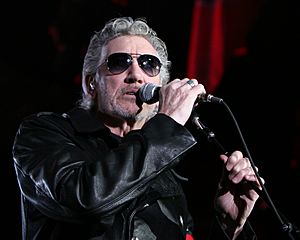
In June 2010, Waters released a cover of "We Shall Overcome", a protest song rewritten and arranged by Guy Carawan and Pete Seeger. He performed with Gilmour at the Hoping Foundation Benefit Evening in July 2010. The set comprised a cover of the Phil Spector song "To Know Him Is to Love Him", which was played in early Pink Floyd soundchecks, followed by "Wish You Were Here", "Comfortably Numb", and "Another Brick in the Wall (Part Two)".
In September 2010, Waters began the Wall Live tour, an updated version of the original Pink Floyd tour, featuring a complete performance of The Wall. At the O2 Arena in London on 12 May 2011, Gilmour and Mason again performed with Waters on "Comfortably Numb", and "Outside the Wall". For the first half of 2012, the tour topped worldwide concert ticket sales, having sold more than 1.4 million tickets globally. By 2013, the Wall Live had become the highest-grossing tour by a solo artist. Waters performed at the Concert for Sandy Relief at Madison Square Garden on 12 December 2012. On 24 July 2015, he headlined the Newport Folk Festival in Newport, Rhode Island, accompanied by the band My Morning Jacket and two singers from the group Lucius. Waters performed at the Desert Trip festival in October 2016.
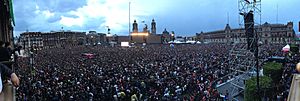
Waters released his first solo album in nearly 25 years, Is This the Life We Really Want?, on 2 June 2017. It was produced by the Radiohead producer Nigel Godrich. Godrich was a fan of Waters' work with Pink Floyd, but was critical of his solo work and encouraged him to make a concise album showcasing his lyrics. Waters returned to North America in 2017 with the Us + Them Tour, performing Pink Floyd and solo material.
On 26 October 2018, Sony Classical Masterworks released an adaptation of Igor Stravinsky's theatrical work The Soldier's Tale narrated by Waters. On 18 April 2019, Waters joined Nick Mason's Saucerful of Secrets on stage at the Beacon Theatre to sing "Set the Controls for the Heart of the Sun". Waters was one of the ten highest-grossing concert acts of the decade.
2020s: This is Not a Drill, Pink Floyd disputes and The Dark Side of the Moon Redux
In January 2020, Waters announced a new arena tour, This Is Not a Drill, that would tour North America and finish one month before the 2020 presidential election. The tour was rescheduled to 2022 due to the COVID-19 pandemic. The concerts were held from July to October 2022, and expanded with dates in Europe from March to June 2023. In 2021, Waters said he had begun writing a memoir during the pandemic. In December 2022, he released an EP, The Lockdown Sessions, comprising six new versions of songs from his solo career and Pink Floyd.
Waters continued to quarrel with Gilmour. In 2021, Waters wrote publicly of their disputes over Pink Floyd reissues and credits, accusing Gilmour of distorting the truth, and complained that Gilmour would not allow him to use Pink Floyd's website and social media channels. Rolling Stone noted that Waters and Gilmour had "hit yet another low point in their relationship".
Early in 2023, Waters gave an interview in which he criticised Pink Floyd's 2022 track "Hey, Hey, Rise Up!", which was released in support of Ukraine. Shortly afterwards, Polly Samson, the wife of Gilmour and a lyricist for Pink Floyd, wrote on Twitter that Waters was antisemitic and "a lying, thieving, hypocritical, tax-avoiding, lip-synching, misogynistic, sick-with-envy megalomaniac". Gilmour responded to the tweet on Twitter: "Every word demonstrably true." Waters released a statement on Twitter saying he was aware of the "incendiary and wildly inaccurate" comments from Samson and was "taking advice as to his position".
For the 50th anniversary of The Dark Side of the Moon, Waters recorded a new version, The Dark Side of the Moon Redux, released on 6 October 2023. It features spoken-word sections and no guitar solos, to "bring out the heart and soul of the album musically and spiritually". In a press release, Waters wrote: "Dave, Rick, Nick, and I were so young when we made [the original], and when you look at the world around us, clearly the message hasn't stuck. That's why I started to consider what the wisdom of an 80 year old could bring to a reimagined version." In October, Waters held two concerts at the London Palladium, where he performed The Dark Side of the Moon Redux, spoke on topics such as Julian Assange and read from his unpublished memoir.
Artistry
Waters's primary instrument in Pink Floyd was the bass guitar. However, he said in 1992 that he was "never a bass player" and was "not interested in playing instruments and I never have been". Gilmour said that Waters used a "limited" and "very simple" bass style and had not been interested in improving, and that Gilmour had played many of the bass parts on Pink Floyd records. According to Mason in 2018, Waters feels that "everything should be judged on the writing rather than the playing".
Waters briefly played a Höfner bass, but replaced it with a Rickenbacker RM-1999/4001S. In 1970, it was stolen along with the rest of Pink Floyd's equipment in New Orleans. He began using Fender Precision Basses in 1968, originally alongside the Rickenbacker 4001, and then exclusively after the Rickenbacker was lost in 1970. First seen at a concert in Hyde Park, London, in July 1970, the black P-Bass was rarely used until April 1972, when it became his main stage guitar. On 2 October 2010, it became the basis for a Fender Artist Signature model. Waters endorses Rotosound Jazz Bass 77 flat-wound strings. He has used Selmer, WEM, Hiwatt, and Ashdown amplifiers but used Ampeg for later tours. He has employed delay, tremolo, chorus, stereo panning and phaser effects in his bass playing.
Waters experimented with the EMS Synthi A and VCS 3 synthesisers on Pink Floyd pieces such as "On the Run", "Welcome to the Machine", and "In the Flesh?" He played electric and acoustic guitar on Pink Floyd tracks using Fender, Martin, Ovation and Washburn guitars. He played electric guitar on the Pink Floyd song "Sheep", from Animals, and acoustic guitar on several Pink Floyd recordings, such as "Pigs on the Wing 1 & 2", also from Animals, "Southampton Dock" from The Final Cut, and on "Mother" from The Wall. A Binson Echorec 2 delay effect was used on his bass lead track "One of These Days". Waters plays trumpet during concert performances of "Outside the Wall".
Personal life
In 1969, Waters married his childhood sweetheart Judith Trim, a school teacher and potter. She was featured on the gatefold sleeve of the original release of the Pink Floyd album Ummagumma, but excised from CD reissues. They had no children and divorced in 1975. Trim died in 2001.
In 1976, Waters married Carolyne Christie, the niece of the third Marquess of Zetland. They had a son, Harry Waters, a musician who has played keyboards with his father's touring band since 2002, and a daughter, India Waters, who has worked as a model. Christie and Waters divorced in 1992. In 1993, Waters married Priscilla Phillips. They had a son, Jack Fletcher. Their marriage ended in 2001.
In 2004, Waters became engaged to the actress and filmmaker Laurie Durning. They married on 14 January 2012 and filed for divorce in September 2015. Waters married his fifth wife, Kamilah Chavis, in October 2021. Waters has homes in Long Island and Hampshire. He is an atheist.
Discography
- Main solo albums
- The Pros and Cons of Hitch Hiking (1984)
- Radio K.A.O.S. (1987)
- Amused to Death (1992)
- Is This the Life We Really Want? (2017)
- Other work
- Music from The Body (with Ron Geesin) (1970)
- When the Wind Blows (1986)
- Ça Ira (2005)
- Pros and Cons (The Interviews) (2015)
- Igor Stravinsky's The Soldier's Tale (2018)
- The Lockdown Sessions (2022)
- The Dark Side of the Moon Redux (2023)
Tours
- The Pros and Cons of Hitch Hiking (1984–1985)
- K.A.O.S. On the Road (1987)
- In the Flesh (1999–2002)
- The Dark Side of the Moon Live (2006–2008)
- The Wall Live (2010–2013)
- Us + Them Tour (2017–2018)
- This Is Not a Drill (2022–2023)
Live band members
Current members
- Roger Waters – lead vocals, bass guitar, rhythm guitars, piano (1984–present)
- Jon Carin – piano, keyboards, programming, lap steel guitar, rhythm guitars, vocals (co-lead (1999–2000, 2006–2008), backing (1998–2000, 2006–2008, 2016–present)) (1999–2000, 2006–present)
- Dave Kilminster – lead guitars, talk box, vocals (co-lead (2006–2008), backing (2006–2008, 2016–present)) (2006–present); additional bass guitar (2006–2013)
- Gus Seyffert – rhythm guitars, bass guitar, backing vocals (2017–present)
- Jonathan Wilson – lead and rhythm guitars, vocals (2017–present)
- Joey Waronker – drums, percussion (2017–present)
- Robert Walter – organ, keyboards (2022–present)
- Shanay Johnson – backing vocals (2022–present)
- Amanda Belair – backing vocals (2022–present)
- Seamus Blake – saxophone (2022–present)
See also
 In Spanish: Roger Waters para niños
In Spanish: Roger Waters para niños


